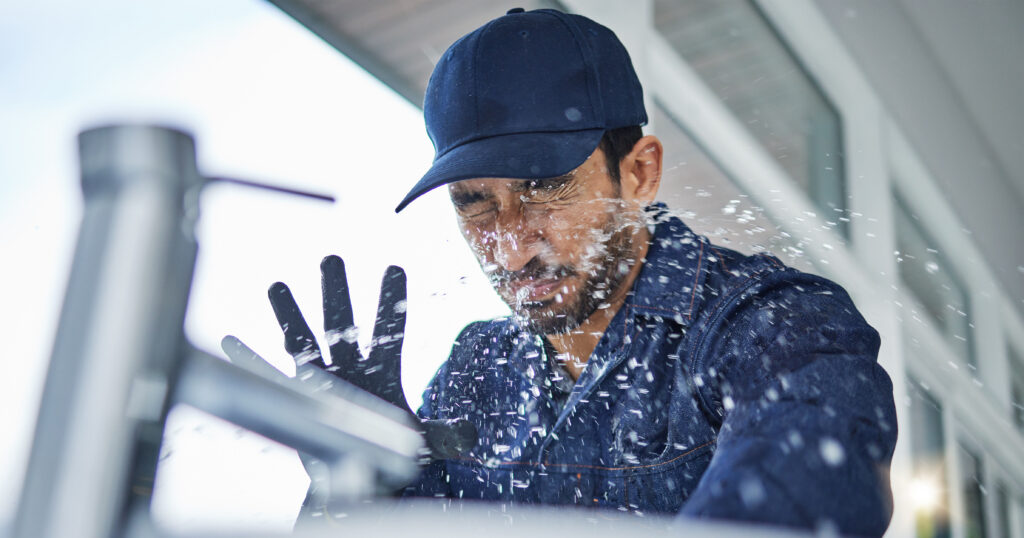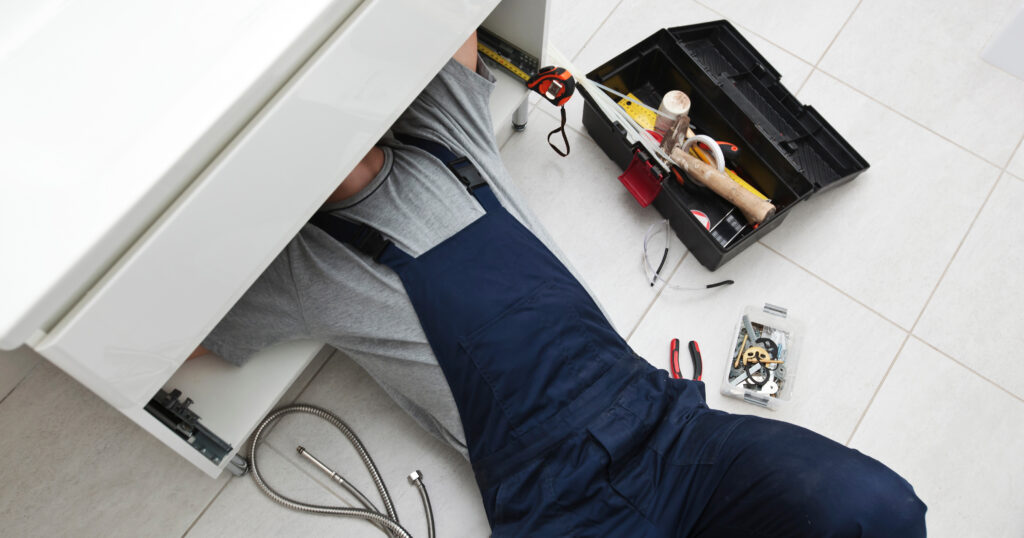The built for service blog
for service blog

Top 10 Issues Plumbers Face
Plumbing
Shannon Ketchum // February 7, 2022
Top 10 Issues Plumbers Face
As a plumber, you are on the front lines of ensuring that our water systems function smoothly and efficiently. You are the unsung hero who tackles clogged drains, leaky pipes, and broken fixtures day in and day out. However, let's be real—plumbing isn't always a walk in the park. Despite your best efforts to prevent them, certain issues seem to constantly crop up and test your skills as a professional. In this blog post, we will explore the top 10 common problems that plumbers face on a regular basis. Whether you're an experienced veteran or just starting in the industry, these insights will not only validate your struggles but also provide useful tips and solutions for overcoming them efficiently. Let’s dive in! RELATED ARTICLE Scaling Up: How to Grow Your Plumbing BusinessTop 10 Issues Plumbers Face:
1. Getting their Hands Dirty
Plumbing is not a glamorous job. Plumbers often must get their hands (and entire bodies) dirty in the name of fixing and installing plumbing systems. If you are squeamish, plumbing isn’t the job for you. Plumbers frequently come face-to-face and sometimes in contact with human excrement and other nasty waste. That’s unavoidable when fixing sewer lines, drains, and toilets. Also, you might get soaked from head to toe if a nearby hose or pipe suddenly bursts. It happens; in fact, you’d be lucky to go home bone-dry after a day of fixing high-pressure systems. It’s a dirty job but hey, someone’s got to do it.
2. Working in Tight Spaces
Sometimes, a building's architecture is a plumber's worst enemy. Pipes, boilers, and drain lines are usually hidden in walls, floors, and crawl spaces. This is bad news for the plumber, who must squeeze into tight spaces to reach a leaking pipe, clogged elbow, or broken valve. Plumbers get into rather uncomfortable positions when working in tight spaces. Imagine how much you'd have to twist your body to tighten a sink's coupling located under a tiny cabinet with a heavy wrench. It’s not unheard of for plumbers to get stuck when working in those tight areas. In which case, having your tummy exposed or plumber’s crack would be the least of your worries.3. Job Fluctuations
Plumbing jobs come and go. Sometimes, you're up to your neck in service orders. Other times, you're sitting by the phone waiting for a job call. Unsteady work is a big challenge when working as a plumbing contractor. It can destabilize your income, making it harder to run the business. FROM ONE OF OUR PARTNERS Boost Your Customer Base with Effective Plumbing Ads4. Odd and Irregular Working Hours
Another consequence of the unpredictable nature of plumbing jobs is working odd or irregular hours. A client will call you in the middle of the night or even during your holiday, seeking help with a plumbing emergency. And you must heed the call—that’s the job you signed up for. Plumbers are like first responders. You must always be ready to hit the road when the call comes. Unfortunately, lacking a predictable work pattern disrupts your sleep-wake cycle. It can also lead to burnout and poor productivity.5. Costly Plumbing Licenses
It costs money to become a licensed plumber. The exact amount will depend on your state's plumbing licensure requirements. Let’s take California, for example. To carry out plumbing jobs exceeding $500, you must get a C-36 license from the Contractors State License Board (CSLB). The initial application fee is $450, followed by a $200 fee after passing the contractor's exam. You'll also have to renew the license every two years for a $450 fee. And that’s not all. Working up the plumbing ranks from apprentice to journeyman to master plumber is quite costly. The training, exam, and license fees start to add up. Also, as a plumbing contractor, you’ll need to pay for insurance and bonding. Cumulatively, insurance premiums will set you back a few thousand dollars every year.6. Dealing with Stingy Clients
So far, we’ve established that plumbing can be a stressful, dirty, and expensive occupation. Yet after a job well done, some clients are reluctant to pay. Delayed or skipped payments are not just a problem for plumbers; it’s an issue for the contracting industry. According to a 2022 report, delayed payments put a $208 billion (about $640 per person in the US) dent in the US construction industry. Given the difficult work they do, it's unfortunate that plumbers must deal with stingy and cheap clients. Chasing down payments is both annoying and disheartening. It also puts undue financial pressure on plumbing contractors who rely on a steady income to keep going. FROM ONE OF OUR PARTNERS The Cost of Plumbing Leads: How Much It Costs to Get More Plumbing Jobs
7. Compliance
Plumbers must adhere to strict regulatory standards and rules. For example, the Occupational Safety and Health Administration (OSHA) has a long list of directives and regulations dictating safety standards in plumbing. Also, local authorities, such as municipalities, expect plumbers to follow specific work codes and quality laws. These laws and regulations are there partly to protect the plumber. They address crucial safety, ethical, and quality concerns in the plumbing business. However, plumbing compliance does not come easily or cheaply. And it’s not like you can overlook compliance. Non-compliance can attract heavy fines and can even cost a plumber their license.8. Maintaining Service Quality
How do you ensure that you consistently deliver quality plumbing services? You just do the best plumbing work possible on an installation or repair. Right? Well, it’s not always that easy. The quality of your work can easily be compromised by forces outside your control. For instance, you can get called back to fix a stubbornly leaky pipe only to discover that the problem is defective components. Poor-quality or failed components can tarnish your reputation as a plumber by having clients question your competence and integrity.9. Acquiring Plumbing Customers
Plumbing is a highly competitive niche. As of 2023, there were over 113,000 plumber businesses in the US. It can be hard to stand out and attract paying customers in such a crowded space. It takes a while to build a large enough customer base to support a plumbing business. And it’s a never-ending effort to keep those customers happy and eager to call you whenever they need plumbing services. FROM ONE OF OUR PARTNERS 5 Ways to Improve Retention Rates for Plumbing Customers10. High Risk of Injury
It might not seem like it, but plumbing is a fairly dangerous profession. Granted, the dangers of plumbing are not always as apparent as in other trades such as construction. While plumbing is nowhere near the most dangerous occupation, plumbers do risk their health, well-being, and even lives when:- Making strenuous and repetitive hand motions
- Treading on wet, slippery floors
- Climbing high heights
- Working in confined or enclosed areas
- Handling high-pressure and high-temperature systems
- Fixing pipes carrying or built with hazardous materials such as asbestos and harmful chemicals

How You Can Start Overcoming the Top Plumbing Issues Right Now
Some issues that plumbers face are unavoidable, while others are well within your control. Here are five tips for solving your top plumbing issues:- Dress the part. Always wear the appropriate work gear when out in the field. Your safety goggles, gloves, overalls, mask, and boots should protect you from most plumbing hazards. You can shop for quality plumber gear and safety clothing online at sites like PlumberStock and TRUEWERK.
- Invest in plumber marketing. Launch elaborate and effective marketing strategies to promote your plumbing company, generate leads, and retain customers. Your success as a plumber could very well hinge on your marketing efforts.
- Update your plumbing licenses. You can't legally operate as a plumber without the proper licenses. Do not risk legal action; get all your licenses in order and up to date. Check your state's requirements for owning and running a plumber contracting service.
- Take control of billing and invoicing. Avoid late payments and defaults by taking charge of billing and invoicing. You could implement a digital billing system that handles all the complicated invoicing. Digital systems also encourage customers to pay on time through automatic reminders and follow-ups. Try Kickserv field service management software for free and sample digitized business management, CRM, invoicing, and more.
- Expand your service portfolio. Expand your plumbing scope beyond just one area. A wider service portfolio opens your company to a broader market. And by offering more plumbing services, your business becomes more resilient and agile.
We think you might love these too.
Never miss a post.
Get notified of new content